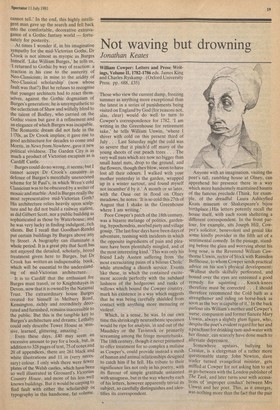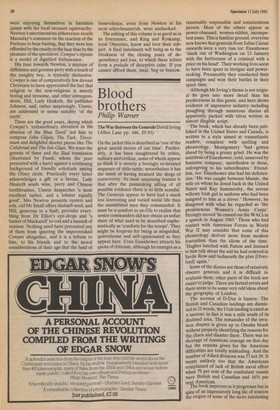Not waving but drowning
Jonathan Keates
William Cowper: Letters and Prose Writings, Volume II, 1782-1786 eds. James King and Charles Ryskamp (Oxford University Press pp. 688, £35) Those who view the current damp, freezing summer as anything more exceptional than the latest in a series of punishments being visited on England by God (for reasons not, alas, clear) would do well to turn to Cowper's correspondence for 1782. 'I am writing in the Greenhouse for retirement sake,' he tells William Unwin, 'where I shiver with cold on this present third of July . . . Last Saturday night the cold was so severe that it pinch'd off many of the young shoots of our peach trees . . . The very wall nuts which are now no bigger than small hazel nuts, drop to the ground, and the flowers, though they blow, seem to have lost all their odours. I walked with your mother yesterday in the garden, wrapped up in a winter surtout, and found myself not incumber'd by it.' A month or so later, with the Ouse out in flood on Olney meadows, he notes: 'It is so cold this 27th of August that I shake in the Greenhouse where I am writing.'
Poor Cowper's patch of the 18th century, was a bizarre melange of politics, gardening, hypochondria, morbid piety and village gossip. 'The last four days have been days of adventure, teeming with incidents in which the opposite ingredients of pain and pleasure have been plentifully mingled, and of the most interesting kind.' This was only his friend Lady Austen suffering from 'the most excruciating pains of a bilious Cholic' while attending a church service. Events like these, in which the contained excitement accords perfectly with the subdued lushness of the hedgerows and ranks of willows which bound the Cowper country, mark his existence in a way which suggests that he was being carefully shielded from contact with anything more menacing or violent.
Which, in a sense, he was. In our own time this shrinkingly neurasthenic specimen would be ripe for analysis, in and out of the Maudsley or the Tavistock or primarily screaming among the fringe mountebanks. The 18th century, though it never presumed to offer treatment for so complex a malaise as Cowper's, could provide instead a mesh of human and animal relationships designed to catch him if he fell. His tribute to their significance lies not only in his poetry, with its flavour of simple gratitude untainted with smugness, but in the way whereby each of his letters, however apparently trivial its subject, so carefully distinguishes and identifies its correspondent. Anyone with an imagination, visiting the poet's tall, rambling house at Olney, can apprehend his' presence there in a way which more handsomely maintained haunts of the famous preclude.(Think, for example, of the dreadful Laura Ashleyfied Keats museum or Shakespeare's bijou birthplace.) His letters potently recall the house itself, with each room sheltering a different correspondent. In the front parlour, for example, sits Joseph Hill, Cowper's solicitor, benevolent and genial like some kindly provider in the fifth act of a sentimental comedy. In the passage, standing before the glass and worrying about his long nose, is the Reverend William Cawthorne Unwin, rector of Stock with Ramsden Bellhouse, to whom Cowper sends practical advice on his son's physical development: Wallnut shells skilfully perforated, and bound over the eyes are esteemed a good remedy for squinting . . Knock-knees therefore must be corrected . . . I should therefore recommend the Cold bath as a strengthener and riding on horse-back as soon as the boy is capable of it.' In the back parlour sits William's mother and Cowper's nurse, companion and former fiancée Mary Unwin, always a slightly glum figure, who, despite the poet's evident regard for her and a penchant for drinking rum-and-water with her dinner, can scarcely have done much to alleviate depression. Somewhere upstairs, bullying his Creator, is a clergyman of a rather more questionable stamp. John Newton, slave trader turned evangelical minister, gets miffed at Cowper for not asking him to act as go-between with the London publisher of The Task, and later turns sour with accusations of 'improper conduct' between Mrs Unwin and her poet. This, as it emerges, was nothing more than the fact that the pair were enjoying themselves in harmless jaunts with the local recusant squirearchy. Newton's sanctimonious abhorrence recalls Macaulay's comment on the reaction of the Puritans to bear-baiting, that they were less offended by the cruelty to the bear than by the pleasure of the spectators. Cowper's riposte is a model of dignified forbearance.
His tone towards Newton, a mixture of diffidence and genuine piety with a touch of the naughty boy, is typically distinctive. Cowper is one of comparatively few devout Christians to have appreciated the fact that religion to the non-religious is merely boring and tiresome, and other correspondents, Hill, Lady Hesketh, the publisher Johnson, and, rather surprisingly, Unwin, are addressed in terms suitably 'of the earth'.
These are the good years, during which Cowper's 'extraordinary elevation in the absence of the Blue Devil' led him to compose John Gilpin, The Task, Tirocinium and delightful shorter pieces like The Colubriad and The Ink-Glass. We trace the genesis of these and the Iliad translation (illustrated by Fuseli, whom the poet presented with a hare) against a continuing background of friendly solicitude among the Olney circle. Practically every letter acknowledges a gift or a favour. Lady Hesketh sends wine, perry and Chinese toothbrushes, Unwin despatches 'a most excellent turbot, and a lobster equally good', Mrs Newton presents oysters and sole, old Mr Small offers rhubarb seed, and Hill, generous to a fault, provides everything from Dr Elliot's eye-drops and 'a basket of Mackarell' to cod and a haunch of venison. Nothing need have prevented any of them from ignoring the impoverished Cowper altogether, and it is a tribute to him, to his friends and to the moral considerations of their age that the fund of benevolence, even from Newton at his most schoolmasterish, went unchecked.
The editing of this volume is as good as in its forerunner, and King and Ryskamp, loyal Olneyites, know and love their subject. A final instalment will bring us to the bleakness of the closing years of despondency and loss, to which these letters form a prelude of deceptive calm. If you cannot afford them, steal, beg or borrow.



































 Previous page
Previous page